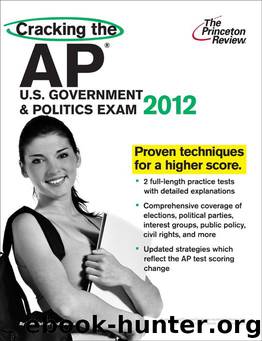Cracking the AP U.S. Government & Politics Exam, 2012 Edition by Princeton Review

Author:Princeton Review
Language: eng
Format: mobi, epub
ISBN: 9780307944504
Publisher: Random House Information Group
Published: 2011-10-18T10:00:00+00:00
CHAPTER 11
1. A The cases of Gratz and Grutter in 2002 involved lawsuits against the University of Michigan by white students who did not get accepted as a result of affirmative action. Though many observers of the Court speculated that affirmative action might be overturned, ultimately the justices upheld it and reinforced the Bakke case. So (A) is correct. Diversity remains the goal of affirmative action, so (B) is wrong. As seen above, (C) did not occur. Though many support affirmative action to right past wrongs, its legal foundation still rests on diversity, making (D) incorrect. Quotas have been illegal since Bakke, so (E) is incorrect as well.
2. C The state cannot engage in prior restraint, the prevention of publication of articles it might find offensive, and this was affirmed in the Near case, making (C) correct. Brown ended segregation, Betts provided lawyers for defendants who were mentally deficient, Sheppard established rules about protecting defendants from being tried in the media, and President Johnson was never involved in prior restraint issues.
3. C Sometimes nicknamed “Gideon’s Trumpet,” the case of Gideon v. Wainwright established that all defendants have the right to counsel, so (C) is correct. Gideon overruled Betts, so (B) is wrong, and Powell (A) was overruled by Brady and is also wrong. Escobedo (D) said that the accused cannot be denied a lawyer after they ask for one, and Miranda (E) held that the arrested need to be informed of their rights.
4. E In the early 1970s, the Supreme Court ruled that the death penalty was being unfairly applied and banned it in the case of Furman v. Georgia, so (A) is incorrect. North Carolina tried to get capital punishment restored by making the death penalty mandatory in some cases, but in Woodson v. North Carolina, the Court struck down this approach, making (B) wrong. Finally, in Gregg v. Georgia, the Court allowed the death penalty to resume, making (E) correct. Bunn and Smith are both cases that deal with religious freedom and are incorrect.
Download
Cracking the AP U.S. Government & Politics Exam, 2012 Edition by Princeton Review.epub
This site does not store any files on its server. We only index and link to content provided by other sites. Please contact the content providers to delete copyright contents if any and email us, we'll remove relevant links or contents immediately.
The Secret History by Donna Tartt(19086)
The Social Justice Warrior Handbook by Lisa De Pasquale(12190)
Thirteen Reasons Why by Jay Asher(8909)
This Is How You Lose Her by Junot Diaz(6885)
Weapons of Math Destruction by Cathy O'Neil(6279)
Zero to One by Peter Thiel(5801)
Beartown by Fredrik Backman(5752)
The Myth of the Strong Leader by Archie Brown(5507)
The Fire Next Time by James Baldwin(5442)
How Democracies Die by Steven Levitsky & Daniel Ziblatt(5218)
Promise Me, Dad by Joe Biden(5153)
Stone's Rules by Roger Stone(5087)
A Higher Loyalty: Truth, Lies, and Leadership by James Comey(4960)
100 Deadly Skills by Clint Emerson(4924)
Rise and Kill First by Ronen Bergman(4788)
Secrecy World by Jake Bernstein(4752)
The David Icke Guide to the Global Conspiracy (and how to end it) by David Icke(4717)
The Farm by Tom Rob Smith(4507)
The Doomsday Machine by Daniel Ellsberg(4490)
